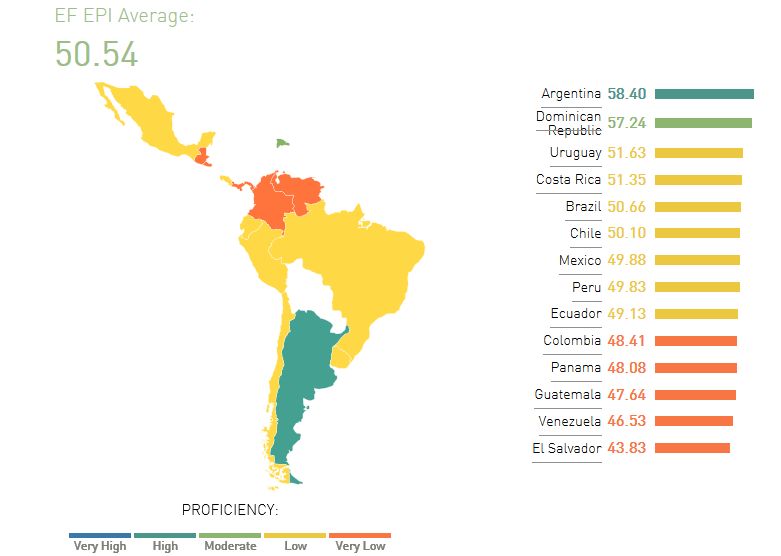Costa Rica News – According to EF English Proficiency Index (EF-EPI), Costa Rica has not been able to raise their level of proficiency in the last five years, same as in El Salvador while Panama and Guatemala, which in 2014 and 2015 did improve their performance, fell in 2016 to the “Very low” level.
The index published each year defines three levels of language proficiency in 72 countries around the world.
In the world rankings, Costa Rica ranked 38 of 72 countries, has a “Low Proficiency”, an EF EPI score of 51.35 and ranks 4th of 14 in Latin America, behind Argentina, Dominican Republic and Uruguay.
Guatemala, Panama and El Salvador, ranked 53, 50 and 63, respectively. Nicaragua and Honduras are not covered in the study.
IN NEARLY ALL COUNTRIES SURVEYED, WOMEN HAVE STRONGER ENGLISH SKILLS THAN MEN.
The EF EPI sixth edition calculated using test data from 950,000 test takers in 2015 reveals Costa Rica has remained “Low” since 2011, without any improvement, while Panama deteriorated from “Low” to “Very Low”.
El Salvador, on the other hand, ranked 63rd worldwide and last place in Latin America, at the “Very Low” level, where it has been since 2012. Only in 2011 did it have the “Low” level.
RESEARCH SHOWS THAT BETTER ENGLISH CORRELATES WITH HIGHER INCOME AND BETTER QUALITY OF LIFE.
Compared with other Central American countries, Guatemala is the third country with the worst level of English, surpassed only by El Salvador. The level according to the 2016 ranking is “Very low”, and a fall was reported compared to 2015 when it ranked in the “Low” level.
About the EF-EPI
The EF English Proficiency Index attempts to rank countries by the average level of English language skills amongst those adults who took the EF test. The index is based on data from a survey, not on a representative sampling model.
The EF-EPI is increasingly cited as an authoritative data source by journalists, educators, elected officials, and business leaders.
Criticism
The EF English Proficiency Index has been criticized for its lack of representative sampling in each country. The report states that participants in the tests are self-selected and must have access to the internet. It is an online survey rather than a statistically valid sampling of the population.
However, there are few alternative comparisons available of countries by their English skills.
From QCostaRica

